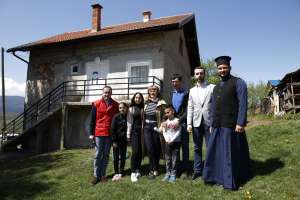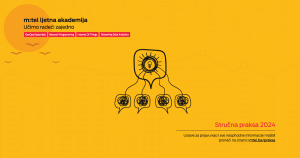SARAJEVO, August 21 (FENA) - Since Mid-March 2020, around 500,000 students in Bosnia and Herzegovina (BiH) were not in their classrooms. Education authorities in BiH attempted to quickly establish different mechanisms for distance learning under challenging circumstances, with varying degrees of success. Although students, teachers and families encountered numerous challenges, we saw some great examples of innovations such as the development of mobile apps and web portals for learning, which enabled a continuous education process.
However, as coronavirus continues to circulate globally and as the new school year is approaching, a debate is raging: when and how to safely re-open schools in BiH, are some of the difficult questions discussed in the address by Dr. Rownak Khan, a UNICEF Representative in Bosnia and Herzegovina and Mr. Siniša Šešum, Head of UNESCO Antenna in Sarajevo, and UNESCO Regional Bureau for Science and Culture in Europe.
The COVID-19 pandemic has caused an unprecedented disruption of education across the globe - around 1.6 billion students have been out of their classrooms for months. This situation has further deepened inequity and exacerbated an already existing learning crisis as millions of children, youth and adults did not have equal access and opportunities to continue learning.
Two things are certain. Firstly, protecting the lives and wellbeing of children, youth, teachers, school staff and students’ families is the utmost priority. Secondly, COVID-19 will remain a challenge for a still unknown period of time and consequently, the permanent closing of schools is not an option. The decision on school re-opening must ensure a balance of health risks against the risk of further learning losses, and therefore safe re-opening of schools is an urgent and complex priority. There is no “one-size-fits-all” approach when deciding, but there is emerging global guidance which can be easily adaptable to the BiH context, while always and firstly ensuring safety for all, is the ultimate goal.
We must all be aware of the profound impact that school closures have on students. Children and youth being away from school for a long time threatens to increase education disparities, provoke significant learning losses during and beyond the COVID-19 crisis, increases the risk of children dropping out of school, especially those from vulnerable families, and undermines the learning progress for generations to come. We should be aware that BiH faced a learning crisis even before the COVID-19 pandemic, as the Programme for International Student Assessment (PISA) 2018 showed that in BiH over 50 percent of children are not achieving the minimum level of functional literacy in language, science and mathematics. There are estimates that this percentage may further increase as a consequence of the COVID-19 crisis.
The longer students stay out of school, the less likely they are to return. This especially applies to the most vulnerable children, such as Roma, those living in rural areas, from poorer families, children on the move or with disabilities. But children and youth are not only risking a learning loss. Schools are places where they get essential services, such as mental health support, health screenings, and therapeutic services. Furthermore, for a number of them, schools also provide them physical safety.
The UN Secretary-General recently issued recommendations on how to consider safe return of children back to the classroom in a policy brief launched with a new global campaign called Save our Future. “We must take bold steps now, to create inclusive, resilient, quality education systems fit for the future” – he urged in his message.
Safe re-opening of schools is a challenging process, requiring a strategic approach across all sectors based on educational, health, social and economic considerations. This process should include close consultations with teachers, families and other community representatives. Still, education authorities can seize this opportunity to ‘open up better’, re-imagining the education sector to be more resilient and adaptable to current and future emergencies.
The UN has provided the global Framework for Re-opening Schools, focusing on safe operations to maintain the health and well-being of students and teachers, while ensuring learning continuity for all, including the most vulnerable. These focus areas should be further supported by effective policy planning and sustainable financial investments in education.
Based on this Framework, we recommend education authorities to ensure equal access to quality learning for the most vulnerable, including by investing in digital connectivity for everyone. This is also an opportunity for innovation to reduce equity gaps by investing in assistive technology for children with disabilities. We need to reimagine learning so that every learner gains the required skills they need to succeed in life and work. Special emphasis is to be placed on the digitalization of education systems and integration of distance and online learning modalities, as a pre-requisite for a flexible and efficient response to future disruptions. And finally, we are urging the authorities to protect and increase education budgets, while ensuring funding is targeted at the most vulnerable.
We are committed to helping BiH to recover, rebuild and re-imagine its education systems. Without a doubt, when schools re-open there might be new emerging risks which education authorities need to closely monitor and adapt to any new epidemiological developments. But whatever happens, education cannot stop. Children and youth in BiH need safer and better schools. To ensure this, all of us need to re-imagine learning, stated the UNICEF in BiH.
(FENA) S. R.









